
Abensberg is a town in the Lower Bavarian district of Kelheim, in Bavaria, Germany, lying around 30 km (19 mi) southwest of Regensburg, 40 km (25 mi) east of Ingolstadt, 50 km (31 mi) northwest of Landshut and 100 km (62 mi) north of Munich. It is situated on the river Abens, a tributary of the Danube.

Dunkel, or Dunkles, is a word used for several types of dark German lager. Dunkel is the German word meaning "dark", and dunkel beers typically range in color from amber to dark reddish brown. They are characterized by their smooth, malty flavor. In informal terms, such as when ordering at a bar, "dunkel" is likely to mean whatever dark beer the bar has on tap, or sells most of; in much of north and western Germany, especially near Düsseldorf, this may be Altbier.
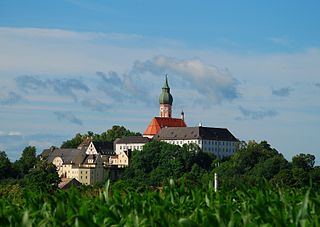
Andechs Abbey is a Benedictine priory in the municipality of Andechs, in the Landkreis of Starnberg, Upper Bavaria, Germany. A place of pilgrimage on a hill east of the Ammersee, the Abbey is famed for its flamboyant Baroque church and its brewery, Klosterbrauerei Andechs, the proceeds from which help fund the monks' mission of help. Composer Carl Orff is buried in the church.

Ettal Abbey is a Benedictine monastery in the village of Ettal close to Oberammergau and Garmisch-Partenkirchen in Bavaria, Germany. With a community of more than 50 monks, with another five at Wechselburg, the Abbey is one of the largest Benedictine houses and is a major attraction for visitors.
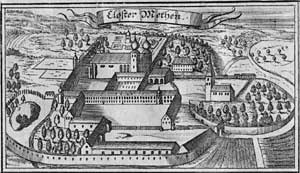
Metten Abbey, or St. Michael's Abbey at Metten is a house of the Benedictine Order in Metten near Deggendorf, situated between the fringes of the Bavarian Forest and the valley of the Danube, in Bavaria in Germany.

Ilmmünster Abbey was a collegiate foundation (Kollegiatstift) of canons, formerly a Benedictine monastery, in Ilmmünster, Bavaria, Germany. The church continues in use as a parish church.
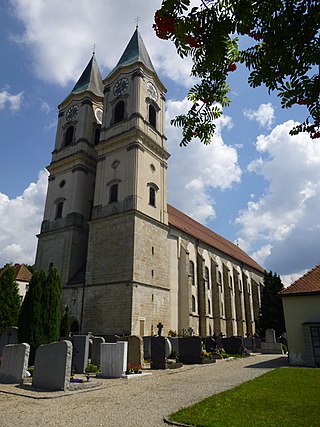
Niederaltaich Abbey is a house of the Benedictine Order founded in 741, situated in the village of Niederalteich on the Danube in Bavaria.
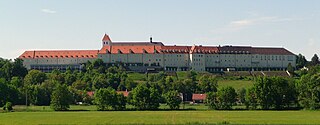
Mallersdorf Abbey was formerly a monastery of the Benedictine Order and is now a Franciscan convent in Mallersdorf-Pfaffenberg in Bavaria.

Benediktbeuern Abbey is an institute of the Salesians of Don Bosco, originally a monastery of the Benedictine Order, in Benediktbeuern in Bavaria, near the Kochelsee, 64 km south-south-west of Munich. It is the oldest and one of the most beautiful monasteries in Upper Bavaria. It was badly damaged in an extreme weather event in 2023.

Plankstetten Abbey is a monastery of the Benedictines located between Berching and Beilngries in Bavaria, Germany. It is a member of the Bavarian Congregation of the Benedictine Confederation.

Thierhaupten Abbey was a Benedictine monastery in Thierhaupten near the Lech River and near Augsburg in Bavaria, Germany.

Prüfening Abbey was a Benedictine monastery on the outskirts of Regensburg in Bavaria, Germany. Since the beginning of the 19th century it has also been known as Prüfening Castle. Notably, its extant dedicatory inscription, commemorating the founding of the abbey in 1119, was created by printing and is a unique document of medieval typography.

Weihenstephan Abbey was a Benedictine monastery in Weihenstephan, now part of the district of Freising, in Bavaria, Germany. Brauerei Weihenstephan, located at the monastery site since at least 1040, is said to be the world's oldest continuously operating brewery.

Mondsee Abbey was a Benedictine monastery in Mondsee in Upper Austria.

Břevnov Monastery is a Benedictine archabbey in the Břevnov district of Prague, Czech Republic. It was founded by Saint Adalbert, the second Bishop of Prague, in 993 AD with the support of Bohemian Duke Boleslaus II. The first Benedictine male monastery in Bohemia, it also has the oldest tradition of beer brewing in the Czech Republic. Brewing was interrupted several times in the history, but up to today, the Břevnov Monastery Brewery brew its beer here.

Wiblingen Abbey was a former Benedictine abbey which was later used as barracks. Today its buildings house several departments of the medical faculty of the University of Ulm. The former abbey is located south of the confluence of the rivers Danube and Iller, south of the city of Ulm in the German state of Baden-Württemberg. Administratively, the former independent village of Wiblingen now belongs to the city of Ulm. The abbey is part of the Upper Swabian Baroque Route.

Prüll Charterhouse, previously Prüll Abbey, is a former Carthusian monastery, or charterhouse, in Regensburg in Bavaria, Germany.
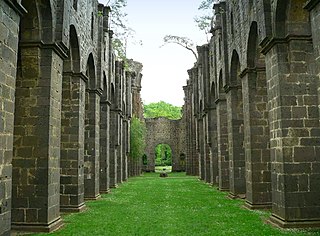
Arnsburg Abbey is a former Cistercian monastery near Lich in the Wetterau, Hesse, Germany. It was founded by monks from Eberbach Abbey in 1174. Although heavily damaged in the Thirty Years' War it was rebuilt later in the 17th century and prospered in the 18th century, when much of the abbey was rebuilt in Baroque style.

Geisenfeld Abbey was a convent in Bavaria, Germany, in the town of Geisenfeld. It was founded in 1037 and dissolved in 1804. At one time it was one of the most prosperous convents in Bavaria.

The Aldersbach brewery is a traditional medium-sized brewery in Aldersbach, Lower Bavaria, opened in the 13th century. It produces beer types such as Dunkel, Helles, and Pilsner, plus seasonal Bock and Pale lagers. In 2016, it won awards from the Bavarian Brewers Association and the Bavarian State Beer Exhibition.

























